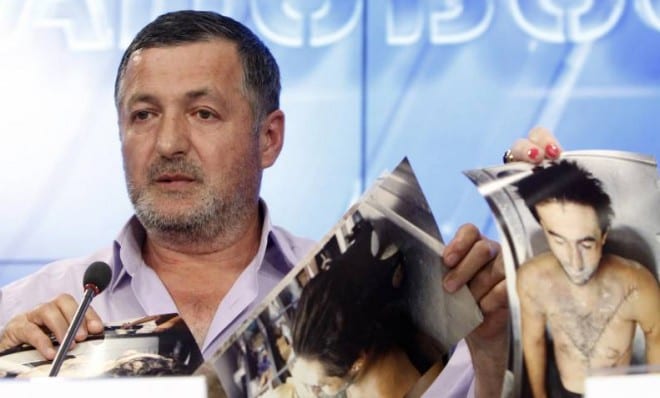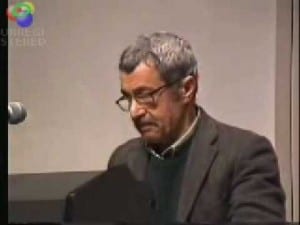Obama and His Allies Say the Govt Doesn’t Listen to Your Phone Calls — But the FBI Begs to Differ

Michael J. “Mike” Rogers: This lying scumbag misrepresents Michigan’s 8th congressional district since 2001.
Today, House Intelligence Committee Chairman Mike Rogers (R-Michigan) insisted [3] the NSA has not been recording Americans’ phone calls under any surveillance program, and that any claim to the contrary was “misinformation.” Rogers’ comments countered remarks from Rep. Jerrold Nadler (D-NY), who said he was told in a House Judiciary Committee briefing [4] by FBI Director Robert Mueller that private firms contracted by the NSA could listen to phone calls made by American citizens.
Since Nadler’s comments were reported by CNET [4], he has issued a subsequent statement backtracking [5] on his original remarks: “I am pleased that the administration has reiterated that, as I have always believed, the NSA cannot listen to the content of Americans’ phone calls without a specific warrant.”
The full transcript of Nadler’s exchange with Mueller shows the FBI director claiming that “a particularized order from the FISA court directed at that particular phone and that particular individual” is required for the FBI to retrieve the content of any American’s call.
However, in a May 1 interview with CNN’s Erin Burnett– well before the scandal over NSA spying sent the White House and its allies into damage control mode – a former FBI agent named Tim Clemente made a startling revelation. According to Clemente, an April 18 phone call between Boston bombing perpetrator Tamerlan Tsarnaev and his wife was retrieved by the FBI as part of its surveillance of bulk US telecom data.
Here is the relevant section of Burnett and Clemente’s exchange [6]:
BURNETT: Tim, is there any way, obviously, there is a voice mail they can try to get the phone companies to give that up at this point. It’s not a voice mail. It’s just a conversation. There’s no way they actually can find out what happened, right, unless she tells them?
CLEMENTE: No, there is a way. We certainly have ways in national security investigations to find out exactly what was said in that conversation. It’s not necessarily something that the FBI is going to want to present in court, but it may help lead the investigation and/or lead to questioning of her. We certainly can find that out.
BURNETT: So they can actually get that? People are saying, look, that is incredible.
CLEMENTE: No, welcome to America. All of that stuff is being captured as we speak whether we know it or like it or not.
Clemente’s comments completely undermine Rep. Rogers’ claim that the government is not recording Americans’ phone calls, and seem to contradict Mueller’s claim that any surveillance that exists is “particularized” according to court orders. Unfortunately, the remarkable statement was buried under the Boston bombings media frenzy, and seems to have been forgotten amidst the latest revelations of NSA domestic spying.
During a March 11, 2011 briefing [7] to the Senate Judiciary Committee, the FBI’s Mueller offered another clue that his bureau was seeking broad access to American phone records. Towards the end of his testimony, Mueller complained that, “our investigations can be stymied by the records preservations practices of private communications providers. Current law does not require telephone companies and Internet service providers to retain customer subscriber information and source and destination data for any set period of time.”
A year later, the FBI formally requested that Congress expand the 1994 Communications for Law Enforcement Assistance Act (CLEA) to ensure that instant messaging, VoIP, and email servers were “wiretap friendly [8].” FBI general counsel Andrew Weissman began the process by drafting legislation requiring online servers to add extra coding to their programs providing the FBI a backdoor into consumer data, including emails and online chats.
This April, at a luncheon for the American Bar Association, the FBI’s Weissman declared [9] that the bureau’s “top priority this year” was to enhance its ability to monitor web based services like Gmail, Google Voice, and Dropbox.
According to Bill Binney, a former high-ranking NSA official who resigned in protest of the agency’s domestic surveillance operations, the FBI depends on the NSA for data on Americans’ phone calls and online communications.
“The FBI is asking for data on Americans – just look at the Verizon court order [10] – and FISA [Foreign Intelligence Surveillance Act special court] is ordering data to be sent to the NSA,” Binney told me. “So the NSA is becoming the central processor and storage facility for government surveillance. That means they are going into emails and chats. They are absolutely involved in collecting data the FBI uses to spy on Americans.”
Given open FBI acknowledgment that it monitors American phone calls on a massive scale, and that it almost certainly relies on the NSA to do so, it is hard to understand the denials by the White House and its allies. Perhaps, like Groucho Marx, they hope we will believe them instead of our own two lying eyes.
Links:
[1] http://www.alternet.org
[2] http://www.alternet.org/authors/max-blumenthal
[3] http://politicalticker.blogs.cnn.com/2013/06/16/rogers-nsa-is-not-listening-to-americans-phone-calls/
[4] http://news.cnet.com/8301-13578_3-57589495-38/nsa-spying-flap-extends-to-contents-of-u.s-phone-calls/
[5] http://news.yahoo.com/jerrold-nadler-does-not-think-nsa-listen-u-163036644.html
[6] http://transcripts.cnn.com/TRANSCRIPTS/1305/01/ebo.01.html
[7] http://www.judiciary.senate.gov/pdf/11-3-30%20Mueller%20Testimony.pdf
[8] http://news.cnet.com/8301-1009_3-57428067-83/fbi-we-need-wiretap-ready-web-sites-now/
[9] http://www.huffingtonpost.com/2013/03/28/fbi-surveillance_n_2970691.html
[10] http://www.guardian.co.uk/world/interactive/2013/jun/06/verizon-telephone-data-court-order
[11] http://www.alternet.org/tags/fbi-0
[12] http://www.alternet.org/tags/nsa
[13] http://www.alternet.org/tags/surveillance
[14] http://www.alternet.org/%2Bnew_src%2B



